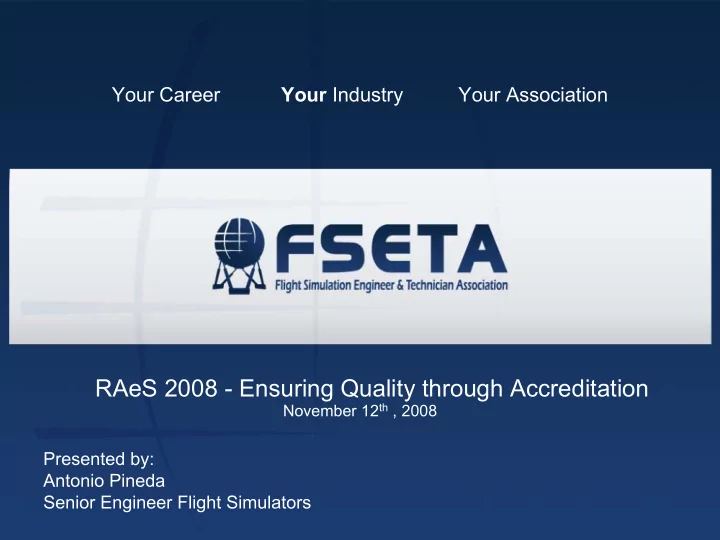

Your Career Your Industry Your Association RAeS 2008 - Ensuring Quality through Accreditation November 12 th , 2008 Presented by: Antonio Pineda Senior Engineer Flight Simulators
Our Mission FSETA is an independent non-profit organisation dedicated to providing standards and services for its members within the flight simulation industry. Our Vision • Establish an identity with a global industry-recognised accreditation for the workforce. • Define career paths and establish criteria to adhere to a common recognized standard of best practices. • Explore and develop solutions for meeting and maintaining regulatory requirements.
Why have an Association? • To have representation from an independent non profit group. • Who’s interest is focused on the people. • To define and maintain high workforce standards. Types of Membership T - Technical (Any Engineer/Technician excluding Apprentice). A - Associate (operator, manufacturer, supplier, test pilot, instructor pilots, technical instructors, support staff). S – Student/Enthusiast/Apprentice.
Accreditation FSETA is currently preparing a comprehensive online application process that will allow its members to apply and gain accreditation based on an independent review of: • Experience. • Training. • Formal qualifications. • Reference from current employer. • Application submission with accountable manager endorsement. This accreditation will initiate the beginning of a global standard for those employed in the flight simulation industry as technicians or engineers.
Implementation plan Phase 1 •Open for industry comment – 31 st Dec 08 •Test trials on selected training centers. •Emirates (UAE). •Emirates CAE Flight Training (UAE). •THALES Training and Simulation (UK). •Q4 Services (USA, UK). •Reporting results at FSEMC in October 2009. Phase 2 •Membership open for everyone. •Formal accreditation for engineers and technicians. •Grandfather rights to those currently employed based on experience, courses attended and current position.
Current regulations-JAA/CAA-FAA JAR/CAA:(JAR STD) • QMS widely implemented :Right people for the right job. •Suitable personnel - Total Quality oriented. •”The provision of adequate financial, material and human resources.” •“Training requirements for the various functions in the organisation.” •“Use of Engineering judgement.” FAA: (Part 60) •” Pre-flight Check done by trained personnel.” •”Special equipment and personnel required to support Certification.” •“Use of Engineering Judgement.” •Qualified personnel. Adequate Maintenance personnel. •Proper technician training including QMS.
Coming regulations-EASA EASA:(EASA workshop 9/10 th Oct2008) • Trained and competent personnel. • Have sufficient appropriately qualified staff for the planned activities. • Maintain appropriate experience, qualification and training records.
Benefits? For individuals: • Accreditation. •Career development. •Industry-wide exposure. •Training and workshops by 3 rd party providers. Generic Training. For associate members: • Organizational accreditation. •Workforce evaluation and accreditation. •Recruitment advertising. •Easier way to reflect current technical level of maintenance team. For the industry: • Standard definition of the professional levels. • Association that represents the workforce. • Opportunities for generic training programs to develop.
Cost? For individuals: • Membership Initial + Renewal. •Accreditation Initial. •Upgrade. For associate members: (Mainly Operators) •Yearly membership •Organisational accreditation is optional. •Workforce accreditation increase Image of operator. •Reduce time and cost of recruitment. •Possibly subsidise or share the cost of workforce. •Membership and accreditation to improve the process. For the industry: • Increase the demand for Training. • Sell more training. • Increase demand for generic training packages.
What Now? The FSETA is requesting support from the audience to distribute the survey throughout the industry to obtain the necessary industry comments The FSETA over the next 12 months will do the following: •Continue to gather industry patronage •Run trial accreditations at several training centers •Obtain independent verification of the accreditation processes •Obtain independent financial accountability • Produce a business case at the FSEMC in 2009 to demonstrate how the association will sustain operations long term
Now open for industry comment www.fseta.com/survey Contact us at info@fseta.com Your Career Your Industry Your association QUESTIONS ……..
Recommend
More recommend